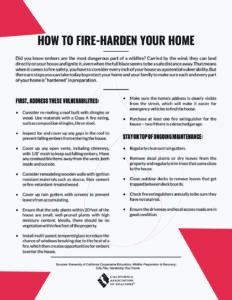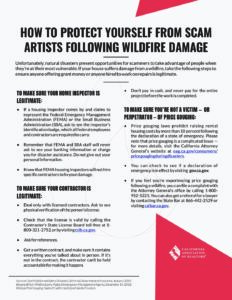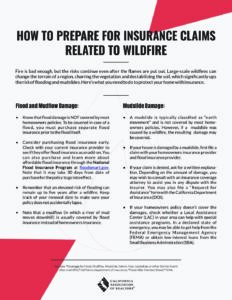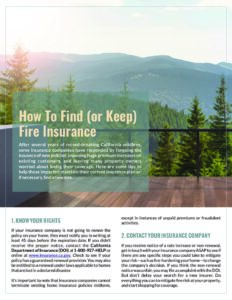Due to wildfire risks in California and an increase in construction costs, insurance companies are forgoing the issuance of new policies, increasing premiums, and making finding and maintaining coverage in many areas of the state more difficult than ever.
California's largest homeowner insurance provider, State Farm, made national headlines when it announced its decision to discontinue issuing new property insurance policies in California, effective from May 27, 2023. In a press release dated May 26, State Farm attributed its withdrawal to "historic increases in construction costs outpacing inflation, rapidly expanding catastrophe exposure, and a challenging reinsurance market."
This decision was followed by a similar announcement by another major provider Allstate Corp in June. Notably, Allstate had already quietly suspended the introduction of new property coverage in California during the previous year, but made it public only this summer.
There are still a wide range of companies writing policies in California. However, those willing to write new policies in higher risk areas are declining. With the departure of State Farm and Allstate, homeowners residing in more high-risk areas may have no other option than to purchase policies under the FAIR plan, which provides basic fire insurance coverage for properties in high-risk areas. FAIR plan policies are seen as a “last resort” option when traditional insurance coverage is not available.
What California Residents Can Do To Find Homeowners Insurance Coverage
Given the anticipation of premium increases by many companies in the coming year, it is prudent for homeowners, even those not affected by an insurer's departure, to periodically compare home insurance quotes to ensure they are not overpaying. This is especially relevant for residents of states susceptible to natural disasters, such as California, as insurers are more likely to adjust premiums regularly due to the heightened risk factors.
The California Association of Realtors® has information and resources for those who are affected by these recent developments. Here are some of the tips from their website:
1. Know your rights
If your insurance company is not going to renew the policy on your home, they must notify you in writing at least 45 days before the expiration date. If you didn’t receive the proper notice, contact the California Department of Insurance (DOI) at 1-800-927-HELP or online at www.insurance.ca.gov. Check to see if your policy has a guaranteed renewal provision.
You may also be entitled to a renewal under laws applicable to homes that are lost in a declared disaster. California recently enacted a consumer protection law that provides temporary relief for some homeowners. In the aftermath of a wildfire and a subsequent state of emergency declaration by the governor, residents residing in ZIP codes near or within the affected area can retain their homeowners insurance. The law imposes a one-year moratorium on the cancellation or non-renewal of these policies following the emergency declaration. For more guidance on protections following a wildfire, visit the DOI’s Top Ten Tips for Wildfire Claimants. The DOI provides an online service on their website that makes it easy to find out if your ZIP code is included in the latest moratorium by entering your ZIP and the name of the fire.
Finally, it's important to note that insurance companies cannot terminate existing home insurance policies midterm, except in instances of unpaid premiums or fraudulent activities.
2. Contact your insurance company
If you receive notice of a rate increase or non-renewal, get in touch with your insurance company ASAP to see if there are any specific steps you could take to mitigate your risk—such as fire-hardening your home—to change the company’s decision. If you think the non-renewal notice was unfair, you may file a complaint with the DOI. But don’t delay your search for a new insurer. Do everything you can do at your property to mitigate fire risk then start shopping for coverage.
3. Work with an insurance agent
Filling out applications and getting quotes from different insurance companies takes time. It can be worth paying an experienced professional a reasonable commission and/or fee to find you the right policy and company to suit your specific or specialized needs. The DOI has an online tool Home Insurance Finder to help you find insurance agents and brokers near you, or check the the FAIR Plan’s Find a Broker tool.
Keep in mind there are different kinds of agents. Some are “captive” which means they can only offer you one insurance company’s products. “Independent” agents and brokers represent multiple insurance carriers and can offer you a broader range of insurance products and coverage options.
Before choosing an agent, make sure to seek out personal recommendations, online reviews, and obtain background information, such as the broker’s license status and any complaints or disciplinary action from the DOI, which keeps track of registered insurance companies, agents, and brokers doing business in the state. Some questions to ask when working with a broker or agent are:
- How long have you been in business?
- Are you a “captive” agent, meaning that you exclusively represent one company? If not, how many companies do you represent?
- If I cancel the policy mid-term, will there be an “earned minimum” premium?
- If I have a loss and need to file a claim, how will you assist me?
- Is there a broker fee plus a commission, and if so, how much will the commission and fee be?
For more tips on picking the right insurance broker for you, visit United Policyholder.
4. Check for policies written by admitted insurance companies
Admitted insurance companies are backed by the California Insurance Guarantee Association (CIGA), which provides protection if the carrier becomes insolvent. Check the Residential Insurance Contact List on the DOI website for a list of admitted insurance companies.
5. Make sure you are not underinsured
Before selecting a policy, make sure it will cover the likely cost to rebuild your home in compliance with current building codes. Consider insuring your property for replacement cost value, not just depreciated, actual cash value.
6. Compare types of insurance and limits
If you have any questions, ask your insurance agent. For example: Will the policy cover the cost of rebuilding your home to its pre-loss condition? Does it cover demolition and debris removal? Is there a coverage limit on temporary rent and expenses while the home is being repaired? What causes of loss are not covered?
7. Check Surplus lines insurance options
Surplus lines (aka “non-admitted” ) carriers do not have CIGA protection, but they often have more flexible offerings and may be the best solution for your particular situation. Just make sure to investigate the overall financial strength of the company by checking its risk profile with the insurance rating company A.M. Best at www.ambest.com or a similar service that monitors the financial strength and creditworthiness of insurance companies. These ratings are crucial for insurance consumers, as they can help assess the likelihood of an insurer being able to meet their obligations to their policyholders..
8. Take advantage of the FAIR Plan
If you’re out of options, contact California FAIR Plan at 1-800-339-4099. The California Fair Access to Insurance Requirements (FAIR) Plan provides basic fire insurance coverage for properties in high-risk areas as a “last resort” option when traditional insurance coverage is not available. A FAIR Plan policy offers protection from risk of fire and will satisfy a mortgage company’s requirement that your home be insured, but it doesn’t cover theft, flood, earthquake, hail, vandalism, or personal liability. Also, a FAIR Plan policy can be expensive, and since it only covers certain losses by fire and smoke so you will need to buy Differences in Conditions (DIC) insurance to cover other perils such as theft and liability.
For more information in navigating your insurance options, download our helpful How-To guides.
How-To Guides




Resources
Many resources exist that are designed to help you make informed decisions when dealing with insurance. The California Department of Insurance website contain a wealth of insurance knowledge and guidance and the Department of Insurance Customer Hotline (1-800-927-4357) connects clients directly to dedicated insurance experts ready to provide support when needed. United Policyholders, a nonprofit that provides insurance information and resources, can help you find insurance in high-risk areas. The association also offers a free webinar titled, "Keeping your home protected when insurance options are limited and expensive" on its website. In addition, a good insurance broker can help guide you in your search. Especially given the challenging conditions of the market, an experienced broker will have the know-how and background to help homebuyers find a policy with adequate coverage at a reasonable price. For help finding a broker, visit the United Policyholder’s online guidance, California Department of Insurance’s Home Insurance Finder or use the FAIR Plan’s Find a Broker tool.
YOU ARE NOT ALONE!
We’re not just here to help you buy and sell real estate. We want to be a resource to our clients and community through good times and bad. If you and your family are in need of assistance, please reach out and let us know how we can help.
The information provided herein are for informational purposes only and not a substitute for legal advice. Your decision to select and contact an insurance provider should be based on your independent evaluation and in your sole discretion. Please visit the Department of Insurance and United Policyholders for further guidance.



